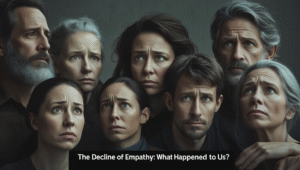Okay, let’s talk. Let’s talk about something that’s been nagging at me, something I’ve been seeing more and more of lately, and honestly, something that’s starting to freak me out genuinely: the decline of empathy.
I’m not talking about “wah, nobody understands ME” levels of empathy. I’m talking about the basic human decency to, you know, not kick someone when they’re down. The fundamental ability to understand that someone else’s experience, even if vastly different from your own, is valid and worthy of… well, at least basic respect.
Instead, what I’m seeing is a relentless stream of mockery, a knee-jerk reaction to poke fun at misfortune, and a disturbingly unwavering belief that “I’m right, you’re wrong, and if you’re suffering, you probably deserved it.”
Seriously, scroll through any social media feed after a semi-newsworthy event and you’ll see it. Someone loses their job? Cue the “get a real job, snowflake!” Someone experiences a personal tragedy? “Thoughts and prayers, but maybe they should have [insert judgmental opinion here].” Someone dares to express a different political view? “LOL, idiot. Eat my [insert political insult here].”
It’s like empathy has packed its bags, sent a postcard from Bali saying “wish you weren’t here,” and then thrown its phone into the ocean.
So, what the heck happened? Where did all the feels go? And more importantly, how do we even begin to claw our way back from this empathy deficit?
Let’s dive in, because this is a complex beast, and I think there are a few major contributors to this whole mess.
1. The Echo Chamber Effect: Living in Our Reality Tunnels
Think of it like this: you’re in a giant bouncy castle, but instead of bouncy walls, you’re surrounded by people who think, believe, and say exactly what you think, feel, and say. Sounds comfy, right? Sure, until you realize you’re completely isolated from anyone who challenges your worldview.
This is the internet in a nutshell. Algorithms are specifically designed to show us content that confirms our biases, reinforces our existing beliefs, and keeps us happily clicking and consuming. We curate our social media feeds only to include people who agree with us, and we happily block or mute anyone who dares to offer a dissenting opinion.
This creates echo chambers where we’re constantly bombarded with validation, making us feel increasingly confident in our righteousness and increasingly dismissive of anyone who thinks differently. And when you’re convinced you’re right, it’s a whole lot easier to dehumanize those who disagree with you. They’re not just wrong; they’re bad.
2. The Rise of Online Anonymity (and the Lack of Real-World Consequences)
Most of us wouldn’t say half the things we type online if we were face-to-face with the person we’re addressing. The anonymity (or perceived anonymity) of the internet gives us a cloak of invisibility, allowing us to say things we’d never dream of saying in person.
Think about it: you wouldn’t walk up to someone on the street and scream insults at them (well, most people wouldn’t). But online? That’s fair game! There’s a perceived disconnect between our online actions and their real-world consequences. We forget that a real human is on the other side of the screen, with feelings and vulnerabilities just like our own.
And when there are no real-world consequences for our online behavior, what’s to stop us from being complete jerks? Nothing.
3. The Culture of Outrage: Getting High on Moral Superiority
Remember when outrage was reserved for, you know, genuinely terrible things? Now, it feels like we’re constantly bombarded with opportunities to be outraged about something.
From mispronounced words to tone-deaf tweets, everything is fuel for the outrage machine. And the more outraged we are, the more virtuous we feel. We get a little hit of dopamine every time we jump on the bandwagon and condemn someone for their perceived transgression.
The problem is that this constant state of outrage makes us less compassionate. We become so focused on finding fault in others that we lose sight of their humanity. We often forget that people make mistakes, that intentions matter, and that sometimes, a little understanding can go a long way.
Plus, outrage is addictive. It feels good to be right, to be morally superior, to be part of the righteous mob. But it’s a fleeting feeling, and we’re constantly chasing the next outrage fix, further desensitizing ourselves to the suffering of others.
4. The Glorification of “Tough Love” (aka Just Being Mean)
There’s a fine line between tough love and just plain meanness. Tough love is about holding someone accountable and helping them grow, even if it’s an uncomfortable process. Meanness is about tearing someone down for your amusement.
Unfortunately, it seems like we’ve blurred that line. We’re constantly being told that we need to be “realistic,” that we need to “toughen up,” and that anyone who shows vulnerability is weak.
This creates a culture where empathy is seen as a weakness, where compassion is ridiculed, and where the only acceptable emotion is cold, brutal cynicism. And let’s be honest, it’s a pretty miserable way to live.
5. The Politicization of Everything (Including Basic Human Decency)
Everything is political now. From the clothes we wear to the coffee we drink, every choice we make is seen as a political statement. And this hyper-politicization has seeped into our ability to empathize with others.
If someone supports a different political party, they’re automatically our enemy. We demonize them, we dehumanize them, and we forget that they’re just people, with families, and hopes, and fears, just like us.
It’s as if we’ve forgotten that we’re all on the same team, working together to build a better society. Instead, we’re constantly at each other’s throats, fighting over every single issue, and losing sight of our shared humanity in the process.
So, What Do We Do About It? Time to Empathy Boot Camp?
Okay, so the diagnosis isn’t pretty. We’re in an empathy crisis. But that doesn’t mean we’re doomed. We can still turn things around. It’s going to take work, effort, and a conscious decision to be better.
Here are a few things we can all do to start cultivating empathy in our own lives:
- Step Outside Your Echo Chamber: Actively seek out diverse perspectives to broaden your understanding. Read articles from different sources, talk to people who hold different beliefs, and challenge your assumptions. It might be uncomfortable, but it’s essential for breaking down the walls of your echo chamber.
- Remember the Human Behind the Screen: Before you type a comment or share a post, take a moment to consider the person on the other side of the screen. Would you say that to their face? If not, maybe rethink it.
- Practice Active Listening: When someone is talking, really listen to what they’re saying. Don’t interrupt, don’t judge, and don’t just wait for your turn to speak. Try to understand their perspective, even if you disagree with it.
- Embrace Vulnerability: Don’t be afraid to show your own emotions. It’s okay to be sad, it’s OK to be scared, and it’s OK to ask for help. Vulnerability is not a weakness; it’s a strength.
- Assume Good Intentions (At Least Initially): Instead of immediately jumping to the worst possible conclusion about someone’s actions, try to assume that they had good intentions. Give them the benefit of the doubt. You might be surprised.
- Focus on Common Ground: Instead of dwelling on our differences, try to find common ground. What do we all want? A safe and healthy community? A good education for our children? A fulfilling life? Let’s start there.
- Practice Gratitude: Take time each day to appreciate the good things in your life. Gratitude can help us feel more connected to others and more compassionate towards their suffering.
- Log Off Now and Then: Seriously. Step away from the screens. Go for a walk, talk to a friend, read a book. Disconnecting from the constant noise of the internet can help you reconnect with your humanity.
- Lead by Example: Be the change you want to see in the world. Show empathy, compassion, and understanding in your interactions. Your actions will inspire others to follow suit.
Look, I’m not saying it’s going to be easy. Reversing the decline of empathy is a monumental task. But it’s a task that’s worth fighting for. Because without empathy, we’re just a bunch of isolated individuals, yelling at each other in the dark.
Let’s choose to be better. Choose to be kinder. And let’s choose to remember that we’re all in this together.
Now, if you’ll excuse me, I need to delete some mean comments and practice some deep breathing. It’s a process, people, a process. And I’m a work in progress. But I’m committed to trying. Are you? Let me know in the comments (but be nice, please!).

